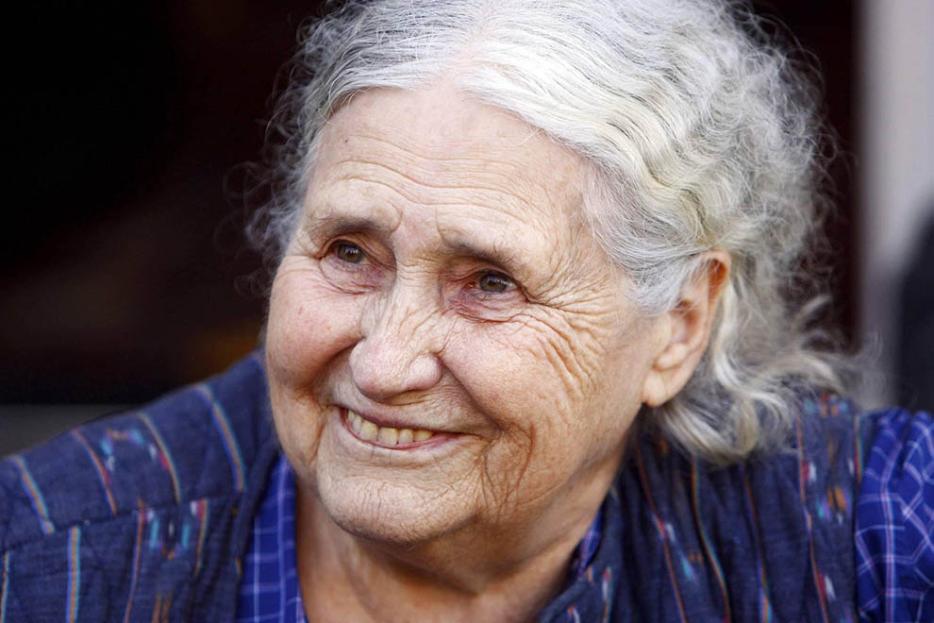When the news came on Sunday that Doris Lessing had died, a YouTube video began making the rounds on social media. It was footage of the moment in 2007 when Lessing learned she’d won the Nobel Prize. “Oh Christ,” intoned that great lady, with the kind of profound annoyance only the elderly can summon. In another age, some disgruntled journalist recording the scene might have presented this as the complaint of a profoundly ungrateful woman. But the video suggests something else altogether: a rebellion against what people typically expect of someone they’ve just showered with laurels. It was a subversive delight.
Doris Lessing, of course, was Just Like That. She was a person who refused to behave as others wanted her to. Which is the reason that a lot of the obituary press has focused on her rejection of labels, and particularly that of feminist—just google “Doris Lessing” and “label” and a wall of hastily assembled journalism hits you. But that has long become a sort of refrain of its own.
Her most celebrated novel likely remains The Golden Notebook hailed by everyone from Atwood to Margaret Drabble. Published in 1962, the same year that David Foster Wallace was born, it was a challenge to the “conventional novel,” breaking up the structure of the narrative with the protagonist’s notebook jottings. Its protagonist, Anna Wulf, was a woman who had a number of ambitions—artistic, political, romantic—and agonized over them in a way many intelligent women responded to at the time. But there now seems some kind of posthumous urge in the eulogies to chip away at that legacy by averring, at every available opportunity, that its author didn’t want people to call it, or her, “feminist.”
I could certainly agree with Lessing that this whole question of whether art is “feminist” can be, and usually is, stupid. It tends to be structured as a puritan’s question, a Christian one: does this comport with doctrine? Is it bringing about the world we want? Lessing was wary of all such religious ways of thinking.
Which, to be fair, she didn’t. In interview after interview she evinced fresh resentment at the very presentation of the “feminist,” though towards the end of her life she must have expected the question. And she got a little saltier than the standard flat denial. “I don’t think that the feminist movement has done much for the characters of women. I mean, we have produced some monstrous women. What has happened is that given the scope to women to be critical and unpleasant, by God they have taken it, so men are suffering from it,” she told the New York Times Magazine in 2008.
If that remark strikes you as overdoing it, I’m with you. Being “critical and unpleasant” was, after all, a trait that marked Lessing’s public persona itself. And as in the video, her particular brand of hard-edged negativity was more of a delight than a downer. It also pleasantly gives you another, if cruder, way to formulate her legacy: Lessing showed us how immeasurably crucial it was, in life and art, not to give a fuck.
This, I will, with posthumous apology say, take to be a “feminist” position as far as the meaning the word “feminist” goes. But then my formulation and use of the word feminist was shaped by the work Lessing and other so-called feminists actually do. And that is work in which substance is more important than label, attitude more important than movement politics.
I could certainly agree with Lessing that this whole question of whether art is “feminist” can be, and usually is, stupid. It tends to be structured as a puritan’s question, a Christian one: does this comport with doctrine? Is it bringing about the world we want? Lessing was wary of all such religious ways of thinking. In one of the (wonderful) CBC Massey Lectures that Lessing delivered in 1985, she was scornful of Christian redemptive thought, not least as it applied to politics:
The Christian believes that he or she is in a vale of tears, a situation from which she or he needs to be rescued, or “redeemed.” This “redemption” will be because of the voluntary sacrifice of a superior being who takes the sins of the world upon himself. There will be a future state of absolute perfection, where there will be no suffering, or sorrow. Before this state is reached, there will be an intermediate time of preparation and of suffering.
And she added, a little later:
Described like this, it sounds like a kind of lunacy—which it is. A lunacy of immense strength.
In other words: only fools believe in full redemption, and this future state of absolute perfection. And sure there have been artists, even great ones, who are or were this variety of fool. And no doubt a few of them were feminists. They were nonetheless misguided.
It is not, I think, that Lessing and others like her don’t believe in social change. It’s that to the extent any art is “revolutionary,” the real change it foments is something at once more gradual and more profound and harder to evaluate from the outset than redemptive views of art permit. Come back and knock on the door in a hundred years and you’ll see if the future you envisioned was at all the one you begot. Another thing Lessing says in that lecture:
It is a process that goes on all the time and I think must go on, because the patterns of the past are so strong in us that criticism of a society and a desire to change it fall so easily into such patterns.
So it isn’t “criticism of society and a desire to change it” that is the problem; it’s “such patterns” of thought.
This perhaps explains why, in better moments than that Times interview, Lessing seemed to understand that Women’s Liberation (as “feminism” was once termed) had a useful purpose, if not a helpful pattern. Even in her most acerbic interviews about the way feminists embraced The Golden Notebook, she’d say things like,
… in the last generation women have become what is known as “free.” And I don’t want to get into an argument about how free they are; that’s not the point. The point is they’re still fighting battles to get free, and rightly.
Or this, from her introduction to a later edition of the novel:
Some books are not read in the right way because they have skipped a stage of opinion, assume a crystallisation of information in society which has not yet taken place. This book was written as if the attitudes that have been created by the Women's Liberation movements already existed.
It was necessary, for example, for the world to believe that women had interior lives every bit as angsty and conflicted and ambitious as men’s in order for the heroine of The Golden Notebook, Anna Wulf, to have the resonance it did.
I could quote to you many more such remarks. For Lessing the problem was never the ideas behind feminism; it was the way the name pinned her in place, attached expectations of redemption and deliverance to her work that I think she was never quite sure it could actually bring about. And Doris Lessing, whatever else she was, was not a woman who liked expectations.
After all, The Golden Notebook, andnearly every novel she wrote, was about what you might call a Difficult Woman—someone like her, someone who could not and would not behave, who left husbands and children because, as she put it, they were fighting a battle to be free. And someone who knew full well that when the world came knocking on her door they were not so much looking for a whole person as for a way to, in a single notebook, contain or reconcile all her multitudes. “People are just cannibals unless they leave each other alone,” Anna Wulf muses. Oh Christ, indeed.






